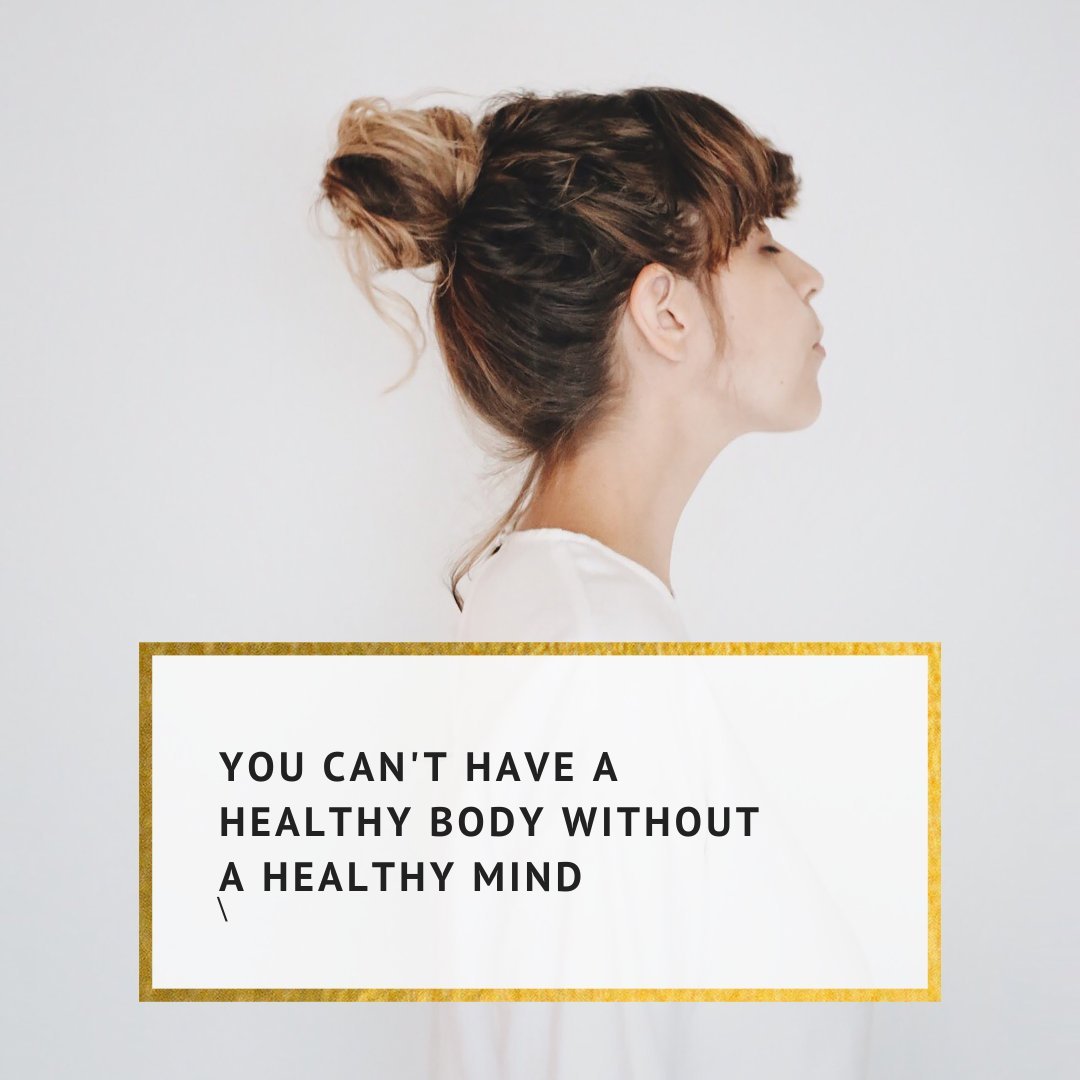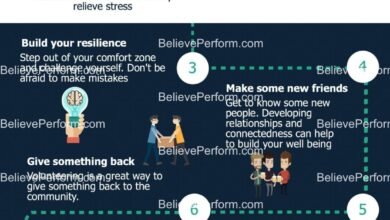
You Can’T Have a Healthy Body Without a Healthy Mind
Imagine waking up each day feeling refreshed, focused, and ready to take on the world. Your body feels energized, and your mind is sharp.
This is the powerful connection between a healthy mind and a healthy body. You might be hitting the gym, eating your greens, and getting enough sleep. But if your mind is cluttered with stress, anxiety, or negativity, your physical health can suffer too.
You can’t separate your mental well-being from your physical health—they’re two sides of the same coin. Discover why nurturing your mind is just as crucial as taking care of your body, and learn simple strategies to achieve balance. Get ready to unlock the secret to feeling your best, inside and out.
Mind-body Connection
The mind-body connection is a vital aspect of overall health. Understanding this link helps us maintain both mental and physical well-being. A balanced mind often supports a healthier body. Stress, anxiety, and depression can impact physical health negatively. Conversely, physical ailments can affect mental state. Cultivating a positive mindset can improve physical health outcomes.
Interdependence Of Mental And Physical Health
Mental and physical health are deeply intertwined. Poor mental health can manifest as physical symptoms. Chronic stress can lead to headaches, fatigue, and weakened immunity. Similarly, physical health issues can strain mental well-being. Pain or chronic illness may lead to anxiety or depression. Maintaining mental health promotes better physical health outcomes. Regular exercise boosts mood and reduces stress. Eating a balanced diet supports both mind and body. Sleep quality affects mental clarity and physical health.
Historical Perspectives On Mind-body Link
Ancient cultures recognized the mind-body connection. Traditional Chinese medicine emphasized harmony between mind and body. Ayurveda, from India, focused on balance for health. Ancient Greek philosophers believed in the unity of mind and body. Modern science also supports these ancient insights. Research shows that mental states can influence physical health. Historical practices teach us the importance of a holistic approach. Embracing these insights can improve health and well-being.
Impact Of Stress On Physical Health
Stress isn’t just an emotional burden. It has a profound impact on your physical health. Understanding how stress affects your body can be the key to unlocking better health and well-being.
Chronic Stress And Its Physical Manifestations
Chronic stress creeps into your life and takes a toll on your body. It can lead to headaches, muscle tension, and fatigue. Have you ever noticed your heart racing after a stressful day? That’s not just a coincidence.
Long-term stress can also weaken your immune system, making you more prone to illnesses. It’s not just about feeling tired; it’s about your body being vulnerable. Managing stress isn’t just a mental exercise; it’s essential for physical resilience.
The Role Of Cortisol In Health
Cortisol, often called the “stress hormone,” plays a crucial role in your body’s response to stress. In small doses, it’s beneficial, helping you respond to immediate challenges. But what happens when your body produces too much cortisol?
Excess cortisol can lead to weight gain, particularly around the abdomen. It affects your sleep, leaving you feeling restless and exhausted. Imagine being stuck in a cycle where stress leads to poor sleep, which in turn causes more stress.
Consider this: how often do you prioritize your mental health? Your body pays the price if you don’t. Taking steps to reduce stress can lower cortisol levels and improve your overall health.
- Try meditation or yoga to relax your mind.
- Engage in regular physical activity to burn off excess energy.
- Ensure you have a support system to share your worries.
Your body and mind are inextricably linked. Prioritizing mental well-being is not just about feeling good; it’s about living a healthier, more balanced life.
Mental Health’s Role In Chronic Illness
Many people think of mental and physical health as separate. In reality, they are deeply connected. A healthy mind can improve your body’s health, especially when dealing with chronic illnesses. Mental health plays a big part in how the body handles disease. It affects how you feel, recover, and live your life.
Depression And Heart Disease
Depression can harm your heart. Feeling low often leads to poor lifestyle choices. People may eat unhealthy foods or skip exercise. These choices can increase heart disease risk. Depression also raises stress hormones. High stress can cause high blood pressure. This puts extra strain on the heart. Treating depression can improve heart health.
Anxiety Disorders And Immune Function
Anxiety can weaken the immune system. Constant worry leads to high stress levels. Stress can reduce the body’s ability to fight infections. Anxiety may also cause inflammation. Inflammation can lead to chronic illnesses. Managing anxiety can strengthen immune function. A calm mind helps the body stay strong against illness.
Benefits Of Mindfulness And Meditation
Mindfulness and meditation are more than just trendy practices—they are powerful tools that can transform your life. These practices offer a multitude of benefits that improve both mental and physical well-being. By dedicating a few minutes each day to mindfulness, you can enhance your mental clarity, reduce physical pain, and elevate your overall quality of life.
Improving Mental Clarity And Focus
Imagine starting your day with a clear mind and focused attention. Mindfulness and meditation help you achieve this by training your brain to concentrate better. Regular practice can sharpen your ability to focus on tasks, making you more productive.
Feeling overwhelmed by thoughts? Mindfulness encourages you to be present, reducing mental clutter. Try a short meditation session before tackling your to-do list. You’ll find that your thoughts become more organized and your decision-making sharper.
Have you ever noticed how a calm mind can tackle challenges more effectively? Mindfulness cultivates patience and helps you respond thoughtfully, rather than reacting impulsively. This change can significantly improve your personal and professional relationships.
Reducing Physical Pain And Tension
Did you know that your mind can influence your body’s pain levels? Meditation and mindfulness techniques can relax tense muscles and alleviate chronic pain. If you’ve ever tried deep breathing exercises during a headache, you’ve experienced this firsthand.
Stress often manifests physically, causing tension and discomfort. Mindfulness reduces stress hormones, which can lead to less physical strain. Incorporating a few minutes of relaxation and mindfulness can ease body aches and help you feel more comfortable.
Consider how a relaxed body can enhance your daily experiences. With less tension, you’re more likely to engage in activities you enjoy, boosting your overall happiness. How often do you pause to check in with your body during the day? A mindful approach encourages you to listen to your body’s signals and respond with care.
By embracing mindfulness and meditation, you open yourself to a world of benefits that can positively impact your mind and body. Give yourself the gift of time and attention—your health will thank you for it.
Exercise For Mental Wellbeing
Exercise is crucial for both body and mind. Moving your body can enhance mental health. Physical activity releases chemicals that boost mood and reduce stress. It helps improve focus, memory, and overall wellbeing. Let’s explore how exercise benefits mental health.
Boosting Mood With Physical Activity
Exercise releases endorphins, the body’s natural mood lifters. These chemicals create a positive feeling. Even a short walk can boost your mood. Regular activity helps fight depression and anxiety. It builds self-esteem and confidence. Exercise also improves sleep, which enhances mood. A well-rested mind feels happier.
Exercise As A Tool For Stress Reduction
Stress affects mental health negatively. Physical activity helps manage stress. Exercise lowers the body’s stress hormones. It also increases the production of endorphins. Moving your body can distract you from daily worries. This break allows your mind to relax. A relaxed mind handles stress better.

Credit: synctuition.com
Nutrition’s Influence On Mental Health
Nutrition’s influence on mental health is a topic gaining traction as more people realize the profound connection between what you eat and how you feel. The food choices you make can either support or hinder your mental well-being. A balanced diet isn’t just about keeping your body fit; it’s equally about nurturing your mind.
Nutrients That Support Brain Function
Your brain thrives on certain nutrients that are crucial for its optimal function. Omega-3 fatty acids, found in fish like salmon and walnuts, are known to improve mood and cognitive performance. B vitamins, such as those in leafy greens and eggs, play a significant role in producing brain chemicals that affect mood and other brain functions.
Ever noticed how you feel more alert after a handful of nuts? Magnesium, often found in nuts, seeds, and dark chocolate, helps regulate neurotransmitters that send signals throughout your brain and body. A deficiency in these nutrients can lead to mood swings, fatigue, and even depression. How often do you think about the nutrients that power your brain?
Dietary Patterns And Mental Wellbeing
Your overall dietary patterns have a significant impact on your mental health. Regular consumption of whole foods like fruits, vegetables, whole grains, and lean proteins has been linked to lower rates of depression and anxiety. Contrast this with diets high in processed foods, sugars, and unhealthy fats, which are associated with increased risk of mental health issues.
Consider the Mediterranean diet, rich in healthy fats, whole grains, and fresh produce. Studies have shown it can reduce symptoms of depression and promote better brain health. You don’t need to overhaul your diet overnight, but small changes can make a big difference. What dietary patterns are you currently following, and how might they be affecting your mental state?
The link between nutrition and mental health is clear and actionable. By choosing brain-boosting foods and mindful eating patterns, you can support a healthier mind and, in turn, a healthier body. Small steps today can lead to significant improvements in your well-being tomorrow. What’s one change you can make today to nourish your mind?
Sleep’s Role In Mental And Physical Health
Sleep is crucial for a healthy mind and body. It acts as a reset button, allowing your brain to process daily events. During sleep, your body repairs itself, strengthening muscles and cells. A good night’s sleep can boost mood, concentration, and physical health.
Sleep Deprivation And Its Effects
Lack of sleep affects your mood and energy levels. It makes concentrating harder. Your body struggles to repair itself, causing fatigue. Sleep deprivation can lead to stress, depression, and anxiety. It weakens the immune system, increasing illness risk.
Improving Sleep Quality For Better Health
Set a regular sleep schedule for better rest. Aim for 7-9 hours each night. Create a calming bedtime routine. Avoid screens before bed. Keep your bedroom cool and dark. Practice relaxation techniques like deep breathing. These steps help improve sleep quality.
Social Connections And Health
Social connections play a crucial role in maintaining overall health. They provide emotional support, reduce stress, and promote happiness. A healthy mind and body rely on these relationships. Understanding their impact can lead to improved well-being.
The Importance Of Support Networks
Support networks offer strength during tough times. Friends and family can provide advice and comfort. These connections help manage stress and improve mental health. Sharing feelings with others reduces anxiety and depression. Social ties also encourage healthier lifestyle choices. People often engage in positive activities with friends.
Loneliness And Its Impact On Health
Loneliness affects both mental and physical health. It can lead to increased stress and anxiety. People who feel lonely often experience higher blood pressure. They may also have weakened immune systems. Loneliness is linked to heart disease and other serious conditions. Building connections can reduce these health risks.
Strategies For Balanced Health
Balanced health isn’t just about physical fitness. It involves nurturing both mind and body. Strategies for balanced health focus on integrating mental and physical wellness. This approach ensures a harmonious lifestyle where both aspects thrive.
Creating A Holistic Health Plan
Start by setting clear health goals. Define what balance means for you. Consider both mental and physical aspects. Break goals into small, achievable steps. This makes them less overwhelming. Include activities that boost your mood and energy. Aim for variety in your routine. This keeps you engaged and motivated.
Nutrition is key in a holistic plan. Choose foods that nourish your body and mind. Fresh fruits and vegetables provide essential vitamins. They support brain function and overall health. Stay hydrated throughout the day. Water helps maintain energy and focus.
Incorporating Mind-body Practices Daily
Mind-body practices connect mental and physical health. Meditation is a powerful tool. It calms the mind and reduces stress. Just a few minutes a day can make a difference. Yoga combines movement with mindfulness. It strengthens the body and clears the mind.
Deep breathing exercises are simple yet effective. They help manage stress and improve concentration. Practice them anytime, anywhere. Mindful walking is another option. Focus on your surroundings and your steps. This enhances awareness and relaxation.
Consistent practice is crucial. Integrate these activities into your daily routine. They become part of your lifestyle. Notice the positive changes in your mood and energy. Balanced health is a journey, not a destination.

Credit: www.linkedin.com

Credit: in.pinterest.com
Frequently Asked Questions
Can You Have A Healthy Body Without A Healthy Mind?
A healthy body often depends on a healthy mind. Mental well-being influences physical health, affecting energy, motivation, and stress levels. Prioritizing mental health supports overall wellness, making it challenging to maintain a healthy body without a healthy mind. Balance between both is essential for optimal health.
Who Said A Healthy Body Is A Healthy Mind?
The phrase “a healthy body is a healthy mind” is commonly attributed to ancient Greek philosopher Thales. It emphasizes the connection between physical health and mental well-being. This idea highlights the importance of maintaining good physical health to support mental and emotional balance.
What Is The Saying For Healthy Body And Healthy Mind?
The saying is “A healthy body equals a healthy mind. ” It highlights the connection between physical fitness and mental well-being. Regular exercise and balanced nutrition promote both physical health and mental clarity, enhancing overall quality of life. Prioritizing a healthy lifestyle supports mental resilience and emotional stability.
What Does The Saying “healthy Body, Healthy Mind” Mean?
The saying “healthy body, healthy mind” means physical health enhances mental well-being. Exercise and proper nutrition improve mood and cognitive function. Maintaining fitness helps reduce stress and anxiety, fostering a positive mindset. Overall, a balanced lifestyle boosts both physical and mental health, creating harmony between body and mind.
Conclusion
A healthy mind leads to a healthy body. Both work together. Stress and negativity harm physical health. Positive thinking boosts well-being and happiness. Simple practices help keep the mind healthy. Meditation, exercise, and good sleep are key. These habits create balance and harmony.
Start with small steps. Build them into your daily routine. Notice the difference in your energy and mood. A healthy mind enhances life quality. Embrace these practices for a better future. Aim for a life full of peace and health.
The journey begins with you.







